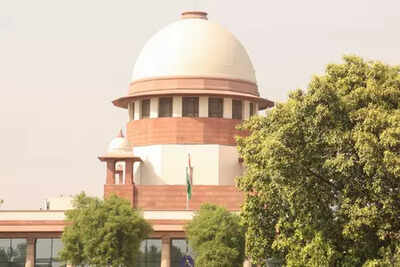ARTICLE AD BOX

New Delhi, India: The Supreme Court on Monday refused to entertain a plea filed by Aam Aadmi Party (AAP) Rajya Sabha member Sanjay Singh challenging the Uttar Pradesh government’s decision to pair and merge 105 government-run primary schools.“Are you not trying to enforce rights under the Right to Education Act? If it is a statutory right, then it cannot be camouflaged as a writ petition under Article 32 (dealing with enforcement of fundamental rights)! Let the Allahabad High Court decide the matter,” a Bench of Justices Dipankar Datta and A.G. Masih remarked at the outset.Sensing the Bench’s reluctance to hear the matter, senior advocate Kapil Sibal, appearing for Singh, sought permission to withdraw the plea with liberty to approach the Allahabad High Court.
The apex court then dismissed the matter as withdrawn.Singh’s petition had argued that the government’s decision, formalised through a June 16 order and a June 24 list, was “arbitrary, unconstitutional, and legally impermissible.”It said the merger of schools with low enrolment had adversely affected access to education, forcing children to travel longer distances without transportation or other facilities.
This, the plea contended, violated the right to free and compulsory education under Article 21A and the Right of Children to Free and Compulsory Education Act, 2009 (RTE Act).Citing Rule 4 of the Uttar Pradesh RTE Rules, 2011, the petition stressed that primary schools must be located “within one kilometre of a child’s residence, particularly in habitations with a population of not less than 300 persons.”“The state government cannot discharge its duty merely by showing that another school exists somewhere in the vicinity.
If the school is beyond 1 km, it violates Rule 4(1)(a) unless the exceptions under Rule 4(2) are met — which they are not,” the plea stated.It further argued that any policy or executive action compelling children to travel unreasonable distances to attend school — such as closures or mergers — is prima facie unconstitutional and contrary to Article 21A and the RTE Act.The petition also cited the Mohini Jain vs State of Karnataka and Unnikrishnan, J.P. vs State of Andhra Pradesh judgments, which affirmed the right to education as flowing from the right to life and dignity, and as a fundamental right up to the age of 14. IANS



.png)
.png)
.png)
















 2 days ago
8
2 days ago
8









 English (US) ·
English (US) ·